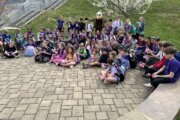WASHINGTON — The posts you “like” on Facebook do more than show support for a friend’s new baby or express your obsession over a video of cute kittens. Your “likes” help scientists understand human behavior.
A team of scientists in the U.K. looked at Facebook likes, isolated from friend networks and photos, and with the data, they were able to predict users’ characteristics and qualities.
“With 95-percent accuracy they could predict your race. With 88-percent accuracy they knew your sexuality. With 85-percent accuracy they knew if you were a liberal or conservative, and with 60-percent accuracy they could tell if your parents divorced before you were 21,” says Christian Rudder, co-founder and president of OKCupid.
In Rudder’s new book, “Dataclysm,” the 39-year-old examines personal information gleaned from social networking sites in chapters stocked with graphs, charts and grids. He breaks down the digital data to look at everything from how humans love, to how they fight, write and age.
“I feel that you read a lot about the creep factor with data,” says Rudder, who cites recent celebrity hackings. “But I wanted to tell the human side of it — look at race, look at beauty, look at attraction, look at politics — you know, the kinds of things that affect a normal person every day.”
Such as the 500 million tweets sent each day by 271 million Twitter users. Rudder’s book explores whether being limited to 140 characters has impacted the written language, since often people criticize the quality of writing on Twitter.
“And I understand that because I see the ‘OMGs’ and the ‘LOLs’ and the ‘roll my eyes,'” he says.
However, when Rudder examined Twitter data, he found the quality of writing on the site to be “surprisingly sophisticated.” He says the average word length is 20 percent longer than Shakespeare’s. Research also shows that the lexical density on Twitter is higher than writing on popular websites and emails.
“To an extent, that 140-character limit is like a constraint that causes people to be more efficient, and in a certain way, be better writers,” Rudder says. “And I think people do follow that, and it improves our writing in some cases.”
While writing his book, Rudder came across plenty of interesting findings, but says the most shocking data he discovered was when he was digging into when and how a racial slur was Googled at the time of the 2008 election and President Obama’s inauguration. From the primary election to the general, he says “searches for [the racial slur] spiked,” a finding he wasn’t expecting.
“You juxtapose that with the images of that night or the feelings that you have of that night of kind of this idea of racial catharsis you have, everyone on TV celebrating … and it’s just jarring,” Rudder says.
However, he says, these findings have the potential to initiate a positive change.
“You have social problems like racism, for example — if there are ever going to be solutions, people need to start tracing their behavior. And being aware and being able to quantify the problem is one important step toward piloting solutions,” Rudder says.
Rudder points out that social media and public sharing have only been around and popular for the last 10 or so years, and as people continue to utilize it, the data that comes from it will continue to improve, helping scientists to further understand human nature.
“In 20 years, imagine how accurate those numbers are going to be when people have grown up with the service,” he says.
“When these services have been around for a whole human life span, or a meaningful part of that, then you have somebody end-to-end, and I think the questions we’ll be able to answer will be incredible. What’s it like to get older? Which now is kind of beyond the range of the data.”
And while Rudder’s “Dataclysm” presents an interesting peek into why people do the things they do, think the way they think and click the way they click, it doesn’t tell the whole story of being human.
“You learn these kind of huge tides that humans see. You see everything moving around in kind of this big aggregated way,” he says. “I think where we’re at now, you can find a lot of really interesting things, but you’re not going to get that 360-degrees of the human experience.”
Follow @WTOP and @WTOPliving on Twitter and on the WTOP Facebook page.







